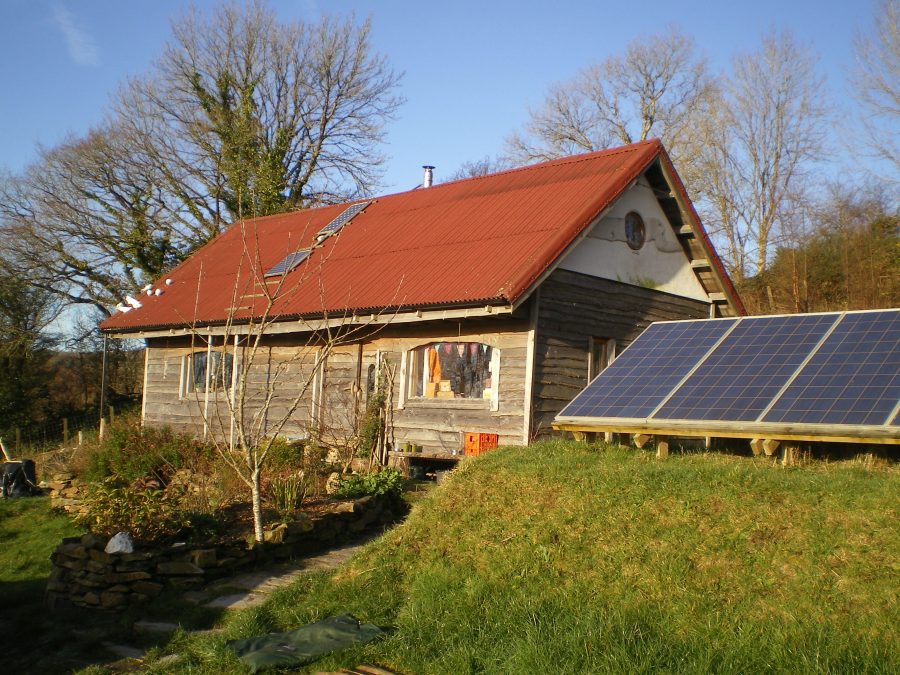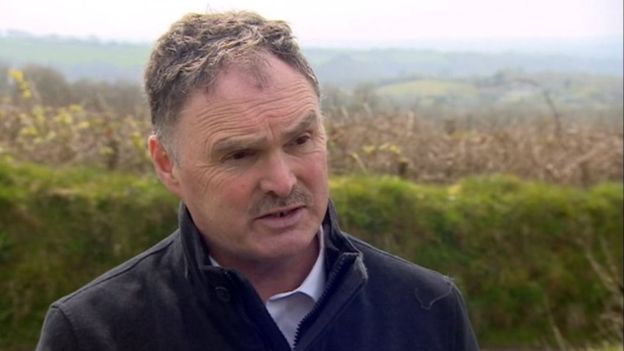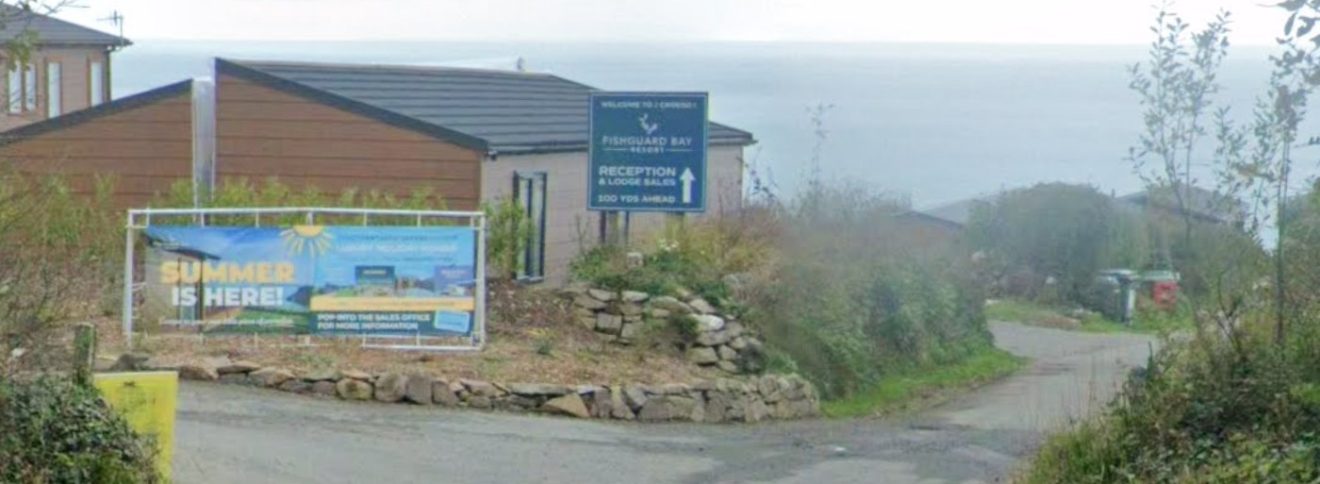News
Council criticised over delays to One Planet Developments

PEMBROKESHIRE COUNTY COUNCIL has come under fierce attack for how it handles One Planet Developments, one of the Welsh Government’s schemes to promote a greener rural economy.
WHAT IS A ONE PLANET DEVELOPMENT?
The Welsh Government defines a One Planet Development as “development that through its low impact either enhances or does not significantly diminish environmental quality. One Planet Developments should initially achieve an ecological footprint of 2.4 global hectares per person or less in terms of consumption and demonstrate clear potential to move towards 1.88 global hectares over time”.
Planning Policy Wales goes on to say that One Planet Developments “should be able to support their inhabitants in terms of income, food, energy and waste assimilation over no more than five years from the commencement of work on the site.”
The key element is that the policy allows new land-based live-and-work enterprises in the countryside provided that strict rules are followed.
The policy has received criticism from planning committee members across West Wales, particularly from those connected to farming areas or who are farmers themselves. They claim the policy is unfair to agricultural families who want to build homes for their children on their land.
As we shall see below, Pembrokeshire’s councillors also grind that particular axe.

Huw George
A READER WRITES
Tesi Delaney has made an application for a One Planet Development. She contacted us recently and told us of her problems in navigating the choppy waters and conflicting agendas of planners who are supposed to assess applications on clear statutory grounds and county councillors determined to block One Planet Developments because ‘Maenclochog’.
She writes: I remember when The Herald published its original article because I was one of the people quoted in it. I had just been refused OPD for my site in Rhosfach, in the Mynachlogddu ward of North Pembs.
My local councillor, Huw George, had been on the BBC, telling the nation that OPD was not fit for purpose.
When I made my second application, Cllr George and I had a meeting along with some other people to discuss my application. He said he would help me, and in the case of a second recommendation for refusal, would insist that the case was taken to the committee to be heard democratically.
Last Friday (November 8), I received my second recommendation for refusal. I am now waiting for a reply from Cllr George, having messaged him the same night to ask if he is still willing to support me.
Cllr George has the power to put my case in front of the planning committee, who have shown themselves largely in favour of OPD applications. This way, my application would be assessed by the committee, and not just be judged on the opinion of one delegated planning officer. In effect, then, my fate lies largely in the hands of someone who is a self-professed opponent of OPD. Tricky.
So we come to our first problem. Why is it that a decision that impacts someone’s life so completely, can be taken by one delegated member of the council planning team?
OPD is still in its infancy, and there are questions on both sides which need ironing out. It seems, however, that the planning officers do not wish to undertake such complicated matters.

Erica Thompson
A TICKING CLOCK
Which takes us to my next point. Why did it take five months to refuse me last time, and nearly seven months this time? The planning schedule is supposed to give you a decision with eight weeks.
If they fail, they are supposed to request an extension before the deadline and ask for more time. On my first application, my planning officer was extremely late asking for an extension and then went over the new deadline anyway.
The second time, I was not even asked for an extension.
Such a long wait has you phoning up in desperation, just to be number 500 in a queue. When you get through they’re “not in the office”.
So you email, and they ignore you. I was asked to not to contact my planning officer. I was expected to be left hanging for months on end, waiting for my life to begin and losing seasons. All while, I felt they put OPD applications aside and dealt with easier matters.
It’s not just me. Local businessman, Daniel Badham – a tree surgeon of high repute in the area, born and bred in Pembrokeshire – applied for OPD on his site in Reynalton last March.
That’s right. Nine months ago.
He feels he has been constantly fobbed him off, just the same as me. Excuses, delays, avoidance.
Daniel has been living away from his daughters the whole time, staying in a caravan on his dad’s farm for what he thought would be about eight weeks. He’s now heading into his second winter. His kids are growing into teens and losing interest in the whole idea; feeling, no doubt like, it’s all some big lie.
And they’d be right.
Not a lie from their dad; a lie from the council about how long they expect these things to take, and as to whether or not it might happen.
Another local, Stephen De-Waine, a fisherman of the Haven since he was a young man, sold everything he owns, including his fishing boat, and purchased a plot of land to do an OPD.
“The thing that worries me,” he said, “is that the council seem to stall OPD for as long as they can get away with it. I’m 54. I can’t waste time waiting for them to decide if it’s going to take me a year”. And he has a point. Unnecessary stress is not something welcome in his life.
And why should it be? It’s only a planning application.
We’re not asking to bring back hanging, although, from the level of vitriolic response to applications, I’m not sure some locals wouldn’t welcome such a thing.
Young people watching my progress on social media, who are thinking as they watch OPD could be of interest to them, must see the aggro and decide firmly not to bother. I know, given my time again, that I wouldn’t. And I’m nearly at the stage where I’d say to anyone, don’t do it.
It’s a nightmare. That’s hardly a good advertisement for a Welsh Assembly policy that intends to do all it can to promote greener, more self-sufficient living.
CRISIS, WHAT CRISIS?
Back in May PCC declared a climate emergency. Since then, they’ve been doing everything in their power to make the greenest policy they have as impossible as they can make it.
I still have no idea why I’ve been recommended for refusal, as my planning officer has made a decision, but hasn’t done the report yet. And I don’t get this information sent to me personally; it’s posted online for me to read in public along with all my objectors.
This is my third point. To apply for OPD you have to present a 50-100 page document, outlining every single detail of your plans, your life, your outgoings, everything – some of it very personal information. This information is then published online. If the council ask you a question and you answer it, they also publish that; which resulted in the council plastering my mental health issues all over the internet.
A quick gander at some of the objections to OPDs and you begin to realise the level of prejudice we’re up against. Everyone panics.
“We’ve got hippies!” They cry.
I used to be a lecturer at the University of Wales, Trinity Saint David, but they see muddy boots and recycled items and they think the brew crew have moved in.
Applicants Rose and Mike Quirk, who own a site in Llangolman, have stated how alien it is for them to be perceived as such ne’er do wells. “We’ve always been respected before!” said Rose, who has degrees in both nursing and psychology. Mike is a traditional timber builder. Their application is currently at the five-month mark. Again, not even close to eight weeks.
So why the lies about the timescale?
Why not admit that they don’t have the resources and tell you you’re looking at around six months, minimum for a decision?
And that’s the fourth point. Lies.
I was told by my planning officer that I wasn’t allowed to see my objections. I have since found this not to be the case. In the end, a friend put in a freedom of information request and got them for me.
Why did that have to happen?
I should have been able to see the objections. How come the objectors get such privacy when my life is laid bare for all to see?
Objectors are usually people who have seemingly wonderful lives, but who somehow have nothing better to do than to constantly complain about everything and anything. They’re the same people who used to phone up DVLA when your tax disc was a day out.
THE COST TO THE COUNCIL
So what happens now? Well, I go to appeal; a very expensive undertaking for the council, and risky for them, as most OPDs are granted permission at appeal, making the whole exercise a waste of everyone’s time and money.
An appeal will take 6- 8 months. If I win, the council have to pay all my costs. They say the applications are taking so long because they’re under-resourced, yet they can suddenly rustle up twenty grand to defend their shortcomings.
And then, are they’re going to take Rose to Appeal? And Dan? And Steve? How many of us are they going to make an example of before they just accept that this is an Assembly initiative which local council politics and nimbyism should have no part in?
OPD is capable of answering legitimate housing and working need for many people in this county, where jobs and affordable homes are few. Farmers are having to diversify. Why shouldn’t they raise a few quid for their retirement by selling a few acres to a couple of young ‘uns, or not so young ‘uns, to create a life for themselves, to provide themselves with jobs, a roof over their head, and be a burden to nobody, doing their bit for climate change?
There’s nothing stopping farming families taking advantage of the policy, enabling them to split farms between family members, and each has their start and chance.
When I first bought my land I tried to find a house to rent locally. So many empty houses, not one for rent. All the little croft cottages are now holiday cottages. So where are we supposed to live?
OPD isn’t for everyone. It’s not an easy life. All the more reason why the people attempting it should be supported in their attempts to create a less consumerist world, planting trees and plants for pollinating insects, growing food and being as self-sufficient as possible, on natural land, that is balanced, cared for and not smothered in pesticides. Soon it may be a lifestyle that everyone has to undertake. That’s worth thinking about.
Even if you get your OPD over the line, it doesn’t stop there. You need to do yearly monitoring reports. If you’re not complying or succeeding as much as they want you to, planners can make you take down everything you’ve worked for, and you’ve got five years to do it all – build a home, a business, and prove your worth. So much for “getting away with it”.
COUNCIL’S PLANNERS AT ODDS WITH OWN POLICY
You can’t incite a revolution if you’re not prepared to fight, as they say. So some of us have to be the ones to get through these early processes. Perhaps don’t have the energy of the guys at Lammas, or Charlie and Meg at the Roundhouse, or Tony Wrench. That’s yet to be seen.
But ultimately, it’s still my land. I have options. But it’s pretty crazy to disallow me to make a home and living for me and my son. The real stinger is that my first refusal said that I hadn’t done enough to start my business. So I’ve been doing loads, setting up stuff, only to be told now that they’re going to refuse me. Not only that, they intend to pretty much immediately enforce my workshop that doubles as somewhere to keep baby goats when it freezes and is where my cats and dogs live.
Pretty soon, all homes will have to be eco homes. The council said this themselves at a meeting in May. The next LDP will contain such policies as all new builds being eco builds. That includes those of Mr George’s farmers he says think developments like mine are unfair to them.
I’ve planted hundreds of trees on my site. I’ve planted hundreds of trees in pots. They’re growing happily on a site the council say can’t grow trees.
My business plan is for a tree nursery, with trees grown with local seed and cuttings, and not imported.
All we see is that governments are encouraging tree planting. As ash die-back decimates our county, the council see fit to refuse an application for a tree nursery. Do you understand? Because I don’t.
COUNCIL SAYS OPD TOO COMPLICATED
Cllr Huw George did not respond to our request for answers to criticisms of him made in this article.
Pembrokeshire County Council told us that OPDs should be regarded as special cases.
“There are significant demands on the local planning authority in terms of resources (time, cost, expertise) not only in assessing applications for One Planet Development but also through monitoring and enforcement.
“The level of detailed evaluation that OPD applications require and the need for clarification or the submission of additional information can lead to applications taking longer than the standard determination period of 8 weeks.
“Retrospective applications can be used as a way of retrofitting unauthorised residential development in the open countryside to One Planet Development policy as a way of obtaining planning permission rather than a genuine desire and commitment to One Planet Development and a low impact lifestyle.”
That got short shrift from Dr Erica Thompson, Chair of the One Planet Council.
“It is disappointing that some applications do take a very long time to reach a decision. We recognise that One Planet Development applications are complex and that there are other planning considerations beyond the “One Planet” nature of the development – and indeed the incredible strain at the moment on council services including planning.
“However, the One Planet Development Practice Guidance published by the Welsh Government assesses whether or not an application conforms to the requirements relatively simple once an officer is familiar with the requirements. The One Planet Council can offer professional training to planning officers by request.
“In approving one recent application, Carmarthenshire Council’s planning committee mentioned their declaration of a Climate Emergency and their commitment to taking commensurate action. Promoting and enabling One Planet Development, though not the whole solution, is one way that councils can take action towards the challenges that the climate crisis presents for us in Wales.
“Pembrokeshire has been leading the way in One Planet Development and we hope that the council will continue to assess applications as fast as is reasonably possible, with fairness against the criteria, so that those who want to take up this opportunity can do so without having to put their lives and businesses on hold.”
News
Labour promises ‘most significant investment in Britain’s ports in a generation’

LABOUR has said this week that it will “Build it in Britain” with the most significant investment in Britain’s ports in a generation, as part of Green Prosperity Plan to support the creation of 650,000 good jobs across the country.
A Labour Government will “Build it in Britain” Keir Starmer said on Thursday, as he visited the North East of England to highlight Labour’s plans to deliver the most significant upgrade of Britain’s ports in a generation.
Visiting a port in the North East, Labour Leader Keir Starmer, Shadow Chancellor Rachel Reeves, and Shadow Energy Secretary Ed Miliband will set out how Labour’s £1.8 billion investment in Britain’s port infrastructure will help crowd billions more of private sector investment into the UK’s energy industry.
Labour’s announcement comes after Jo Stevens, Shadow Secretary of State for Wales, visited the Port of Milford Haven in Pembrokeshire last month alongside with Henry Tufnell, Labour’s parliamentary candidate for Mid and South Pembrokeshire, to learn more about the port’s operations and challenges.
After the visit, Shadow Welsh Secretary Jo Stevens said: “Upgrading our ports, like this one here in Milford Haven, can help us seize the golden opportunity we have to become a world leader renewable energy, delivering cheaper bills and the jobs of the future.
“But the Conservative government is holding Wales back, with narrow-minded, poorly run investment schemes that leave us lagging behind international competitors.
“A UK Labour government will switch on GB Energy to invest in projects that can secure our lead in floating offshore wind, unlocking the jobs and investment that the Tories have left to languish.”
Henry Tufnell, Labour’s candidate in this year’s General Election, added: “Pembrokeshire’s first Labour MP, Desmond Donnelly, was instrumental in the creation of the Port of Milford Haven, transforming Pembrokeshire’s economic fortunes. Today, as in the 1950s, we face a crossroads. We must put our county at the forefront of a new Labour Government’s industrial strategy to build it in Britain.
Labour’s Green Prosperity Plan will secure our energy supply, develop industry, and create good well paid jobs right here in our county. We don’t want the young people of Pembrokeshire to feel they must leave their home county to get on in life. We want to provide opportunity here, and we want to provide it now.”
Labour’s plan for ports will help reverse fourteen years of industrial decline under the Conservatives and support domestic manufacturing across the country. The pledge is funded through Labour’s Green Prosperity Plan, which includes a proper windfall tax on the oil and gas giants making record profits, to fund investment in British industries.Keir Starmer’s announcement comes as Labour confirms that its Green Prosperity Plan will help support the creation of up to 650,000 good jobs in Britain’s industrial heartlands, including here in Pembrokeshire, by crowding billions of private investment into industries such as Britain’s nuclear, steel, automotive, and construction industries.
The last Labour government led the way on upgrading Britain’s ports, providing funding for the development of port sites to support offshore wind turbine manufacturing. This industrial advantage has been squandered after fourteen years of the Conservatives, with recent research showing the UK could have created almost 100,000 more jobs in the wind industry if it had followed Denmark’s example in recent years and built up domestic supply chains in clean energy.
Speaking ahead of the visit, Labour Leader Keir Starmer outlined the choice facing millions of voters: continued industrial decline after 14 years of Conservative rule, or national economic renewal with Labour, saying:“The legacy of fourteen years of Conservative rule is Britain’s industrial strength reduced to the rubble and rust of closed-down factories. They have let good jobs go overseas and done nothing about it, and every community has paid the price.
“A Labour government will reindustrialise Britain – from the biggest investment in our ports in a generation, to a British Jobs Bonus to crowd billions of investment into our industrial heartlands and coastal communities.“
The wealth of Britain was once built on a bedrock of industrial jobs that offered security and a good wage. By investing in Britain’s homegrown energy sector, we can rebuild this dream for the twenty-first century- good jobs, higher wages, and the pride that comes from good work for all.”Through policies such as Great British Energy, the National Wealth Fund, and the mission for Clean Power by 2030, a Labour government will invest in technologies like floating offshore wind, hydrogen, nuclear, and carbon capture and storage, which will help secure Britain’s energy independence.
This will create a new generation of skilled jobs in growing industries, which will offer people good wages, give confidence in their job security, and provide them with opportunities to progress. This policy is part of Labour’s Green Prosperity Plan, to cut energy bills for families, make Britain energy independent, and rebuild the strength of British industry.
This historic investment in working people and their communities is the only way out of the high energy bills, energy insecurity, and the doom loop of low growth, high taxes and crumbling public services under Rishi Sunak’s Conservatives.Commenting on Labour’s landmark plan to invest in Britain’s port infrastructure, Shadow Energy Secretary Ed Miliband MP said: “Making Britain a clean energy superpower requires flourishing national ports. Whilst the Conservatives are letting other countries plunder jobs that could be ours here in Britain, Labour has a plan to help win the race for the industries of the future.“
This is what Labour’s Green Prosperity Plan will do for every community in Britain – slash energy bills, create good jobs, boost our national energy independence, and help to tackle the climate crisis.”
Business
Scheme to upgrade Dinas Cross holiday park withdrawn

PLANS to create a ‘five-star resort’ in one of Wales’s most popular holiday locations have been withdrawn.
In an application submitted to Pembrokeshire Coast National Park, Chester-based Boutique Resorts Ltd sought permission to relinquish 50 mixed touring pitches (caravans and tents) at Fishguard Bay Resort, Dinas Cross, replacing them with “36 high quality timber-effect holiday lodges”.
The application, recommended for refusal at the April 24 meeting of the national park’s development management committee, also included an increase in the site area of the approved park, a new entrance, a new reception lodge, staff and visitor parking area, with extensive environmental improvements.
The site, established in the 1950s, currently has planning permission for 50 static caravans and 50 mixed touring units, and it is intended 23 of the proposed lodges to be sited at the entrance, with a further 13 throughout the site.
Despite the proposals seeking a reduction in outright numbers, the applicants say the scheme would see an increase in the number of full and part-time jobs associated with the resort, from 29 to 62 jobs.
A previous application was refused in 2019, mainly on visual impact, ecological impact and highway impact, and the applicant has sought to address the issues raised by that refusal, a supporting statement says.
It adds: “The applicant purchased the site in 2014 with the intention to upgrade the site into a five-star luxury resort. This is very much still the applicant’s intention and whilst he has replaced some existing static caravans with luxury lodges, he also seeks to replace the touring caravans and tents with luxury lodges too.
“The resort is now considered one of the most desirable holiday parks on the Pembrokeshire Coast which is evident on the number of holidaymakers who return to the resort year on year. Such is demand for luxury lodges on the site, the applicant requires additional units.
“The applicant now wishes to move the resort further by replacing the mixed touring pitches with luxury lodges but also provide a much-needed new entrance into the resort.”
Objections to the scheme were received from the National Trust, the national park’s strategic policy and ecologist, and the South Wales Trunk Road Agency, and 12 members of the public, along with one letter of support.
The application was recommended for refusal for reasons including it was “likely to have a significant detrimental impact on the special qualities of the National Park by intensifying the visual impact and intrusion of a large static caravan site within the extensive coastal views of this section of the National Park,” it would represent an intensification of the site, and was likely to “have an unacceptable impact on neighbouring residential amenity through increased noise and traffic movements”.
The application, listed for consideration by park planners next week, has since been withdrawn.
News
First step towards council tax and business rate reform

MAJOR reforms to council tax and business rates have cleared the first hurdle in the Senedd.
MSs backed the general principles of the local government finance bill, which would introduce a five-year cycle for council tax revaluations from 2030.
The bill would lay much of the groundwork for Welsh Government proposals to redesign council tax, with current bands based on property values from 2003.
It would also increase the frequency of business rates revaluations from five to three years.
Rebecca Evans told the Senedd the bill forms a vital part of the Welsh Government’s wider programme of local tax reform.
Wales’ finance minister explained the bill would enable ministers to modify business rate relief exemptions and the multiplier to support policy priorities.
John Griffiths outlined the local government committee’s stage-one report recommendations aimed at improving the bill and guarding against unintended consequences for taxpayers.
Mr Griffiths explained that the bill provides a framework for future policy changes to be made by the Welsh Government via secondary legislation.
The Labour MS, who represents Newport East, said the committee heard concerns that this limits opportunity for public engagement and scrutiny by the Senedd.
Welcoming the Welsh Government’s commitment to retaining the single-person council tax discount at 25%, he highlighted wide-ranging powers in the bill over vital reduction schemes.
In terms of business rates, the committee chair said MSs heard broad support for a move to three-yearly revaluations, which he described as a reasonable, proportionate cycle.
Peredur Owen Griffiths, who chairs the finance committee, backed the bill’s key aim to create a fairer, more flexible system.
The South Wales East MS welcomed reassurances from the Welsh Government that the intention of council tax reforms is not to raise more revenue.
“Given the regressive nature of council tax, we support the aim to make it fairer without affecting the tax base,” he said.
Plaid Cymru’s finance secretary said the proposed powers will reduce the Welsh Government’s reliance on UK bills to make changes.
Alun Davies, a Labour backbencher, warned that delegated powers in the bill risk diminishing the role of the Senedd.
Sam Rowlands, the Tories’ shadow local government secretary, raised concerns about the bill putting more power in the hands of the Welsh Government rather than councils.
He warned the bill is a stepping stone towards higher taxes through the back door, saying: “This bill in and of itself does not necessarily do that but it certainly enables future changes.”
The former leader of Conwy council, who represents North Wales in the Senedd, called for reforms to the formula used to allocate funding to Wales’ 22 councils.
Raising concerns about digital exclusion, Mr Rowlands opposed a provision in the bill which would remove a duty to publish council tax notices in local newspapers.
He said: “We believe it’s a really important part of the democratic process in local government, especially in relation to transparency.”
Backing a revaluation of all 1.5 million properties in Wales, Labour MS Mike Hedges described council tax as fundamentally unfair.
He said: “Someone living in a property worth £100,000 pays around five times as much council tax relative to the property value as someone living in a property worth £1m.”
Mr Hedges, who represents Swansea East, also opposed the removal of the duty to provide council tax information in newspapers.
On business rates, he said: “I’ve always supported the returning of them to local authorities. We don’t need an all-Wales system; let each local authority set its own business rates.”
Ms Evans told the chamber she intends to make a statement on the next steps for council tax reform before the summer recess.
The Senedd agreed the general principles of the reforms without objection, and the bill now moves to stage two which will see MSs consider detailed amendments.
-

 Business3 days ago
Business3 days agoBluestone National Park Resort payments expected to end
-

 Community5 days ago
Community5 days agoThe Harbourmaster: Special rail excursion draws crowds to Milford Haven
-

 News4 days ago
News4 days agoDragon LNG ‘monitoring’ scrap car blaze in Waterston
-

 News5 days ago
News5 days agoSearch for Luke, 19, reported missing in the Pembroke Dock area, continuing
-

 News2 days ago
News2 days agoSearch for missing teenager Luke continues at Pembroke Dock
-

 Crime3 days ago
Crime3 days agoEstate agents admit health and safety failings following fatal market incident
-

 News6 days ago
News6 days agoMajor search in the area of The Cleddau Bridge and Hobbs Point
-

 News2 days ago
News2 days agoMan jailed after scarring police officer in Narberth altercation







































